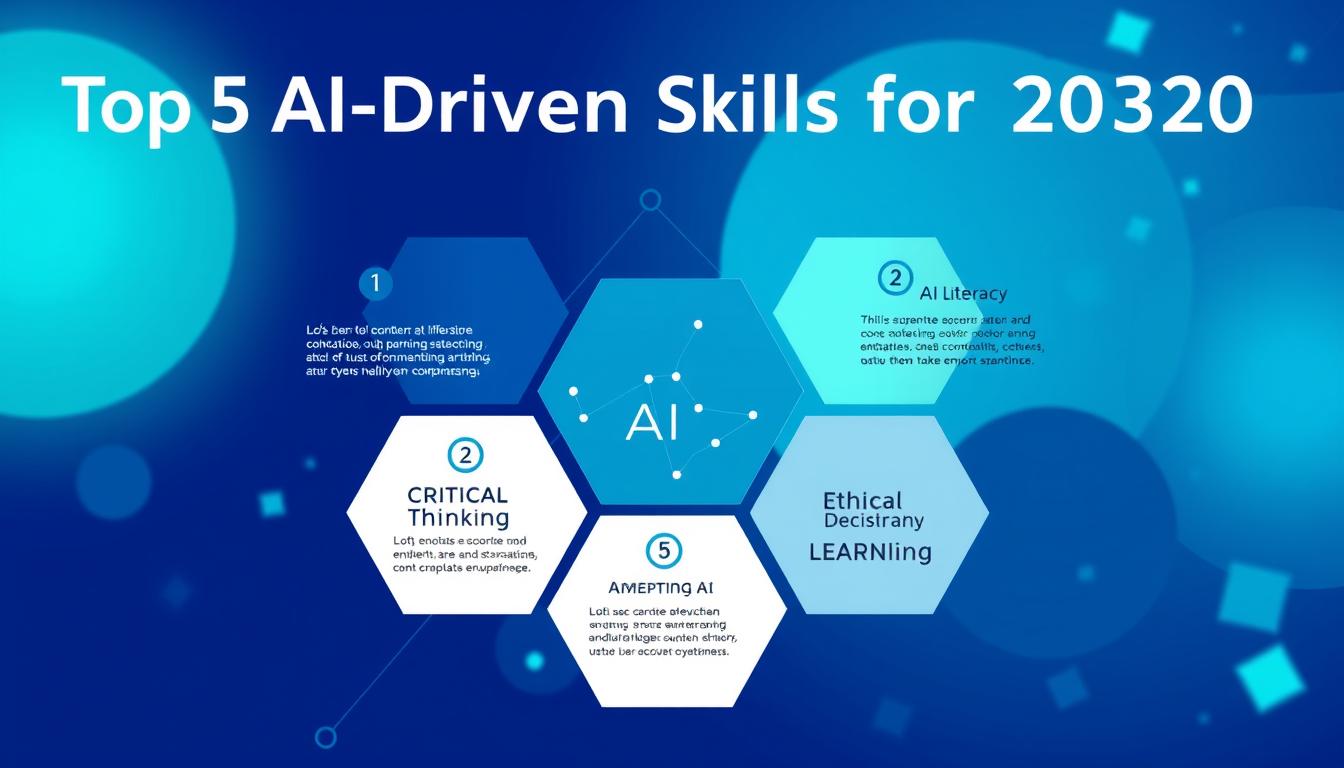
AI and Future Skills: Redefining Career Development in the Digital Age
The workplace is undergoing a profound transformation driven by artificial intelligence. As AI technologies continue to evolve at an unprecedented pace, the skills needed for career success are being fundamentally redefined. According to recent research from Jobs for the Future (JFF), we’re witnessing a significant shift in how jobs are designed and what employers value most in their workforce. This transformation isn’t just about technical capabilities—it’s reshaping the entire landscape of career development.
Since the public release of ChatGPT in late 2022, job postings mentioning AI have increased by 108%, jumping from 730,000 to 1.5 million in just two years. This rapid adoption signals a new era where understanding and leveraging AI will be crucial for career advancement across virtually all industries. But which skills should you focus on developing? How can you prepare for a future where AI is an integral part of the workplace? This guide explores the essential skills, strategies, and insights you need to thrive in the AI-driven career landscape.
How AI Reshapes Skill Demands
The integration of AI into workplaces is creating a dual demand for both technical proficiency and enhanced human capabilities. JFF’s research reveals that as AI adoption accelerates, employers are increasingly seeking professionals who can work alongside these technologies while bringing uniquely human strengths to the table.
Top 5 AI-Driven Skills for 2030 based on current workplace trends and projections
Technical Skills in the AI Era
While specialized technical skills remain important, JFF’s analysis shows they’re experiencing high rates of churn as new technologies emerge and others become obsolete. This technological acceleration, driven by AI adoption, is shortening the useful life of many specialized digital skills.
Digital Literacy
Basic understanding of AI systems, data analysis, and digital tools has become essential across all industries. Even roles that don’t directly involve programming now require the ability to interpret data and work with AI-powered platforms.
Specialized Professional Skills
Domain-specific knowledge continues to be valuable, with employers seeking professionals who can apply their expertise within increasingly AI-enhanced environments. These specialized skills allow workers to provide context and judgment that AI systems currently lack.
Human Skills Gaining Prominence
Perhaps the most significant finding from JFF’s research is the rapidly increasing demand for human skills across all occupations. As AI handles more routine tasks, uniquely human capabilities are becoming the key differentiators in the job market.

Modern workplaces increasingly feature humans collaborating with AI tools to enhance productivity and innovation
Generalized Professional Skills
Skills like critical thinking, problem-solving, and project management are consistently appearing in job postings across sectors. These transferable capabilities allow professionals to adapt to changing technologies and apply their expertise in various contexts.
Human-Centered Skills
Communication, leadership, initiative, and adaptability are seeing the most significant growth in demand. JFF’s analysis found these skills are increasingly prioritized even in highly technical roles, suggesting they’re more resilient to AI displacement.
Assess Your AI Readiness
Discover how your current skill set aligns with future workplace demands. Our AI Skills Assessment Tool helps you identify strengths and development areas to focus your career growth.
Case Studies: AI Transformation in Action
JFF’s research provides valuable insights into how organizations are adapting to AI-driven changes in the workplace. Their analysis of workforce training programs reveals practical approaches to developing the skills needed in this new landscape.

Training Providers Embracing AI
JFF’s research found that effective training providers are strengthening their organizational capacity to support learners in an AI-powered future. Through interviews with industry leaders, JFF developed recommendations for educational institutions to adapt their curricula and teaching methods.
Key findings include the need for training providers to incorporate both technical AI skills and human capabilities into their programs. The most successful organizations are creating flexible learning pathways that allow students to continuously update their skills as technologies evolve.

Small Businesses Leading AI Adoption
JFF conducted a national survey to understand how small businesses are approaching AI adoption. Their research revealed that many organizations are moving toward implementing AI solutions while focusing on creating economic opportunities for both employees and the business.
The most successful small businesses are implementing worker-centric AI adoption strategies that prioritize upskilling existing employees rather than replacing them. These organizations view AI as a tool to enhance human capabilities rather than substitute for them.
“We believe the transformation set in motion by generative AI is accelerating shifts that will meaningfully change in-demand jobs and skills, with implications for a wide array of stakeholders from training providers and employers to policymakers and investors.”
Strategies for AI-Ready Career Development
Based on JFF’s research and broader industry trends, several key strategies emerge for professionals looking to thrive in an AI-enhanced workplace. These approaches focus on continuous learning and strategic skill development.

Continuous learning has become essential for career development in the AI era
Embrace Continuous Learning
Formal Education
Consider specialized courses in AI fundamentals, data analysis, or machine learning. Many universities and online platforms offer flexible programs designed for working professionals. JFF’s research indicates that formal credentials still carry weight, especially when combined with practical experience.
Micro-Credentials
Short, focused learning experiences can help you quickly acquire specific skills. Look for industry-recognized certifications in emerging technologies or methodologies. These credentials allow you to demonstrate expertise in particular areas without committing to lengthy degree programs.
Develop a T-Shaped Skill Profile
JFF’s analysis suggests that the most resilient career strategy involves developing what’s known as a “T-shaped” skill profile—combining deep expertise in one area with broad capabilities across related domains.
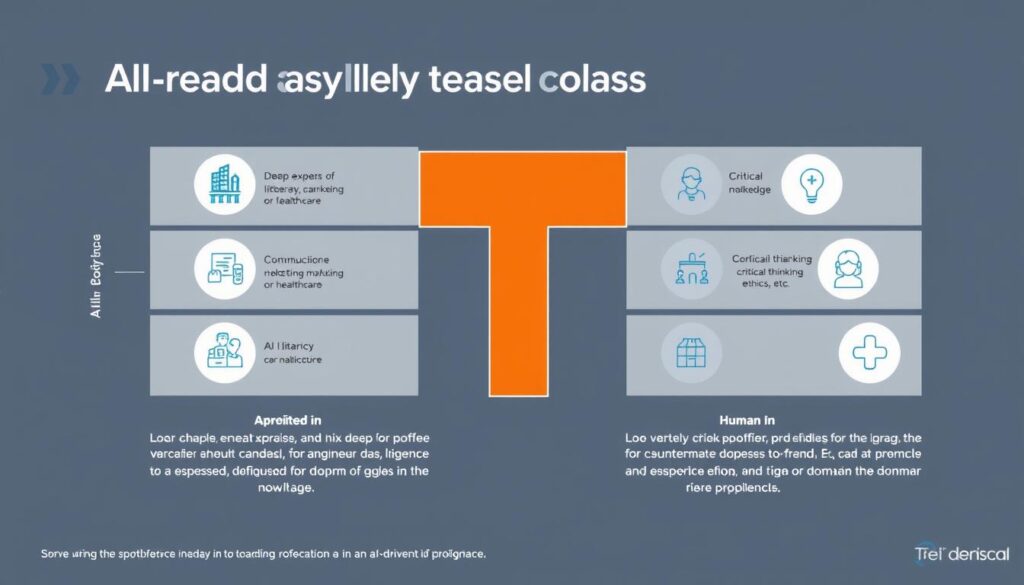
The T-shaped skill profile combines deep expertise with broad capabilities
Depth: Technical Mastery
Develop deep expertise in your primary field while understanding how AI is transforming that specific domain. This specialized knowledge provides the foundation for your professional identity and value proposition.
Breadth: Human Capabilities
Cultivate the human skills that JFF’s research shows are increasingly in demand: critical thinking, communication, leadership, and adaptability. These capabilities help you work effectively across disciplines and with diverse teams.
Practical Application Strategies
Accelerate Your AI Skills Development
Get our comprehensive guide to developing the most in-demand AI and future skills. Includes practical exercises, learning resources, and expert insights.
Industry-Specific AI Skill Insights
JFF’s research reveals that while certain AI skills are universally valuable, industry-specific applications require tailored approaches. Understanding how AI is transforming your particular sector can help you focus your skill development efforts more effectively.
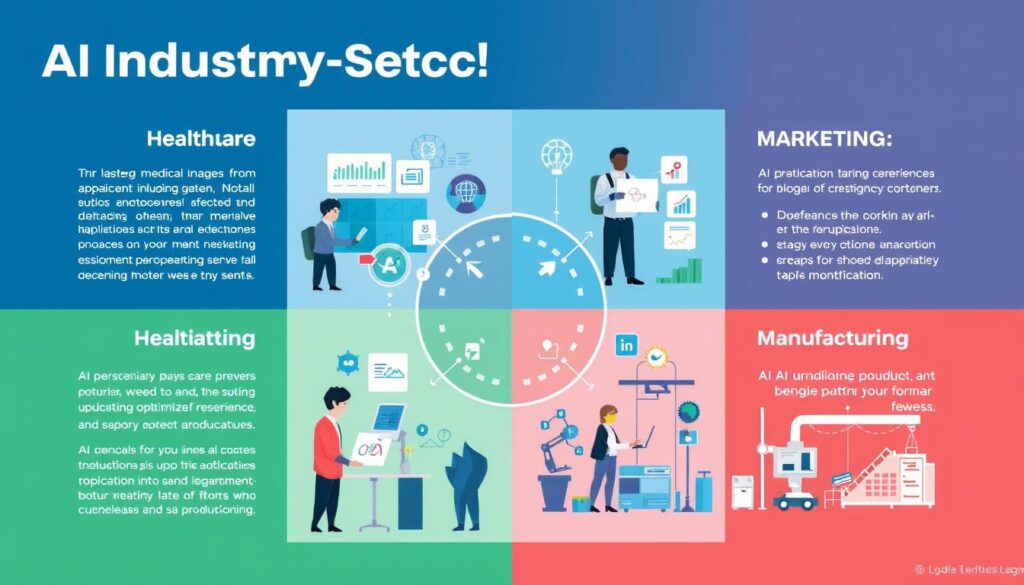
AI applications vary significantly across industries, requiring specialized knowledge
Healthcare
AI is transforming patient care through predictive analytics, diagnostic assistance, and personalized treatment planning. Healthcare professionals need to develop skills in medical data interpretation while maintaining strong patient communication abilities.
Finance
In financial services, AI drives algorithmic trading, risk assessment, and fraud detection. Professionals should focus on understanding financial data analysis while developing ethical decision-making capabilities for algorithm oversight.
Marketing
AI enables hyper-personalization, predictive analytics, and automated content creation. Marketers need to balance technical skills in customer data analysis with creative thinking and strategic communication abilities.
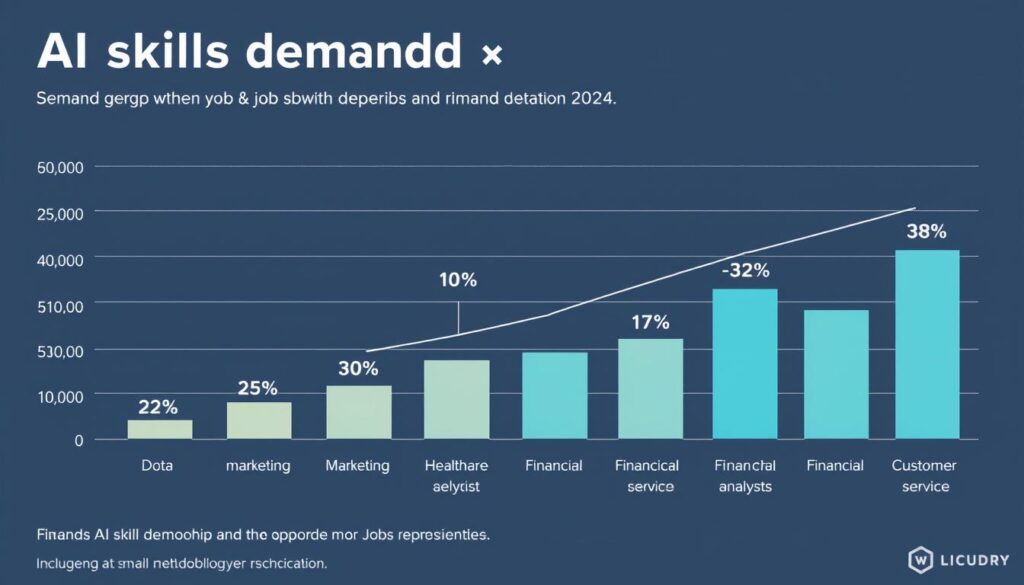
Growth in AI skills demand varies significantly across job categories
JFF’s analysis found that even within industries, different roles are experiencing varying levels of AI impact. For example, in customer service, AI is handling routine inquiries while human representatives focus on complex problem-solving and emotional intelligence. This shift requires customer service professionals to develop higher-level communication skills alongside technical capabilities for working with AI systems.
Key Insight: JFF’s research shows that AI is not simply replacing jobs but transforming them. The most successful professionals will be those who can work alongside AI systems, providing the human judgment, creativity, and interpersonal skills that complement automated processes.
Future Outlook: The Evolving AI Skills Landscape
Looking ahead, JFF’s research points to several emerging trends that will shape the future of work and the skills needed for career success. Understanding these developments can help you position yourself advantageously in the evolving job market.

The future workplace will feature increasingly sophisticated human-AI collaboration
Emerging Trends in AI and Skills Development
AI Democratization
As AI tools become more accessible and user-friendly, basic AI literacy will become an expected skill across virtually all professional roles. This democratization means that even non-technical professionals will need to understand AI capabilities and limitations.
Ethical AI Governance
With growing concerns about AI bias, privacy, and transparency, skills in ethical AI implementation and oversight will become increasingly valuable. Professionals who can navigate these complex issues will be particularly sought after.
Human-AI Teaming
The ability to effectively collaborate with AI systems will become a distinct professional skill. This includes knowing when to rely on AI and when to apply human judgment, as well as how to interpret and communicate AI-generated insights.
Continuous Adaptation
Perhaps the most critical future skill will be the ability to continuously learn and adapt as technologies evolve. JFF’s research suggests that this meta-skill—knowing how to learn effectively—will be essential for long-term career resilience.
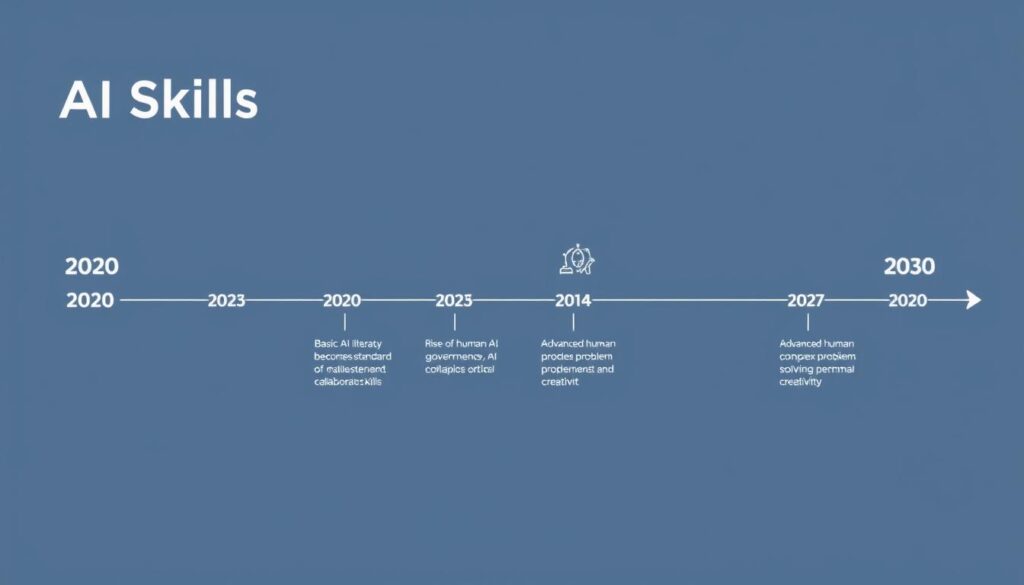
The evolution of AI skills shows a progression toward more sophisticated human-AI integration
“Jobs across the economy are increasingly seeking AI skills. We see growing prioritization of generalized professional skills like critical thinking and problem solving, and human skills like initiative, leadership, and communication in tandem with the growth of AI.”
Stay Ahead of AI Career Trends
Subscribe to our newsletter for regular updates on AI developments, emerging skills, and career opportunities. Get expert insights delivered directly to your inbox.
Conclusion: Embracing the AI-Powered Future of Work
The integration of AI into the workplace represents both a challenge and an opportunity for career development. JFF’s research clearly shows that while AI is transforming jobs across industries, it’s not simply replacing human workers—it’s changing the nature of work itself and creating new demands for both technical and human skills.
The most successful professionals in this new landscape will be those who can adapt continuously, developing the unique combination of specialized knowledge, technical capabilities, and human skills that AI cannot replicate. By embracing lifelong learning, cultivating critical thinking and creativity, and developing the ability to work effectively alongside AI systems, you can position yourself for success in the evolving world of work.
As you navigate your career development in the age of AI, remember that the goal isn’t to compete with artificial intelligence but to complement it. By focusing on the distinctly human capabilities that JFF’s research shows are increasingly in demand—communication, leadership, ethical judgment, and creative problem-solving—you can create a sustainable career advantage that will serve you well regardless of how technology continues to evolve.
Take the Next Step in Your AI-Ready Career
Download our comprehensive AI Skills Development Roadmap to create your personalized plan for thriving in the AI-powered workplace of tomorrow.